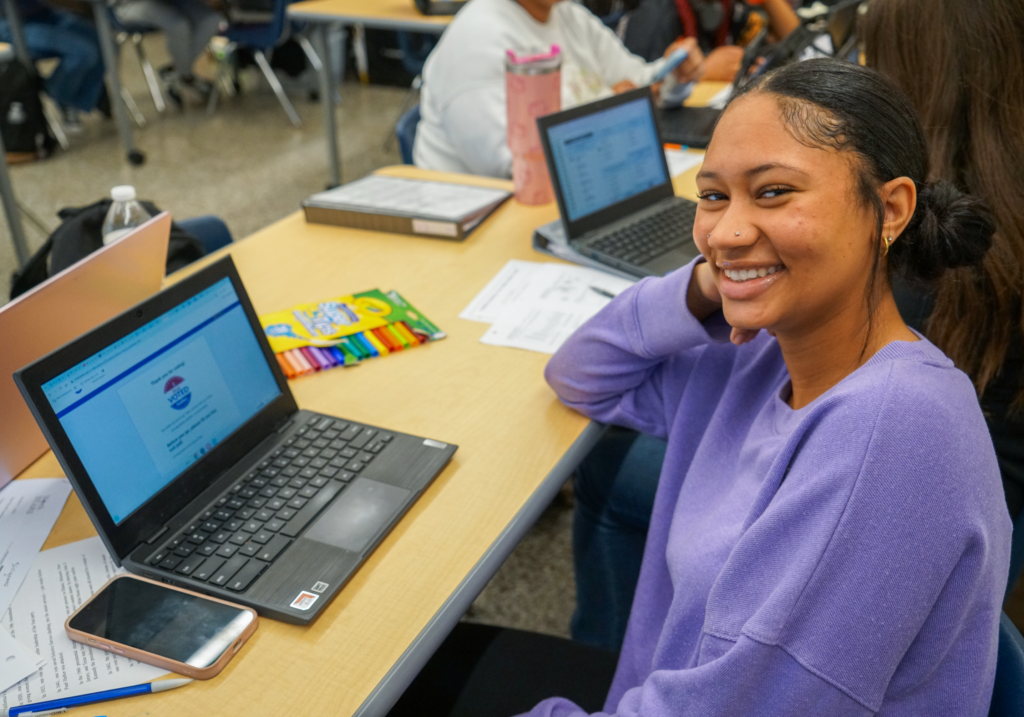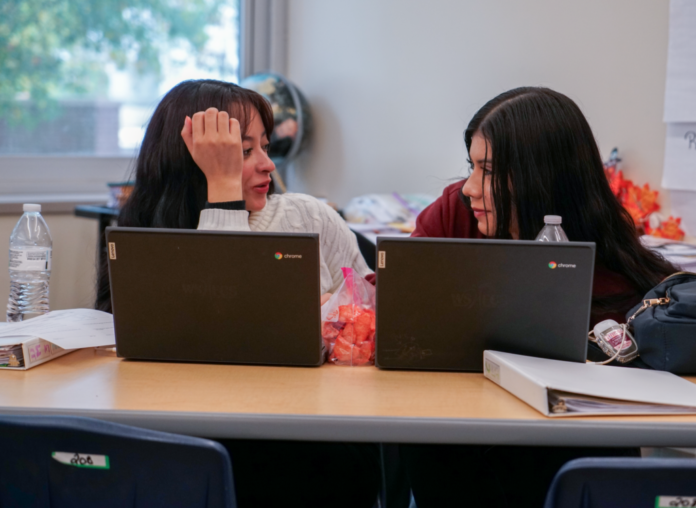Fall leaves aren’t the only pops of color you’ll see out on the road in early November. Whether you’re on a city street or a back road, red and blue campaign signs are out as Election Day arrives.
Millions of voters in North Carolina have already cast their ballots in the 2024 election, according to data from the North Carolina State Board of Elections (NCSBE). For some of them, it was their first time voting.
In Tammy Sicignano’s class at North Forsyth High School, several eligible students cast their first votes while dozens of other students practiced voting this year using a software called First Vote NC.
“When I first started teaching here, I found First Vote, and I’ve been using it ever since,” said Sicignano.

First Vote NC is EducationNC’s online, simulated election experience for North Carolina’s future voters. For the 2024 general election, students received a web-based ballot similar to the one a future voter would receive if they were going to the polls. First Vote NC is available to all North Carolina K-12 students.
This year, the ballot included national and statewide races, including:
- U.S. President
- Governor
- Lieutenant Governor
- Secretary of State
- State Auditor
- State Treasurer
- Superintendent of Public Instruction
- Attorney General
- Agriculture Commissioner
- Labor Commissioner
- Insurance Commissioner
- N.C. Supreme Court Justice
- N.C. Court of Appeals Judge
The First Vote NC ballot was live for early voting and available through Nov. 5, 2024. First Vote NC participants used laptops, desktop computers, phones, or tablets to cast their ballot.
The voting experience also offered an optional exit poll and receipt of an “I VOTED” virtual sticker. Results will be available after the election, so First Vote NC voters can see how their vote compares to the general election results.
Civic ready students
“What was the amendment that gave us the right to vote, girls?” asked Sicignano.
“19th!” answered the class.
“And what year did it pass?” she asked.
“1920,” the class said.
Sicignano has been an educator for nearly her entire career. For over 20 years combined, she has taught at middle and high schools in Virginia and North Carolina. She’s been a social studies teacher at North Forsyth High School since 2017.
Before teaching her current classes in women’s studies and personal finance, Sicignano was a civics teacher for many years. Even though she isn’t teaching any civics classes this year, she is incorporating civic opportunities in all of her classes.


Women’s studies was Sicignano’s first class of the year to use First Vote. Her personal finance class also used the software.
In her women’s studies class, Sicignano taught about the history of voting and how, when, and why people vote. One of her goals with these lessons is for her students to learn how to critically think for themselves and do their own research.
One way she teaches critical thinking is through asking them questions, including but not limited to:
- Do you know where your candidate stands on the issues?
- What are some of the major issues in this election?
- What are some of the qualifications in order to be president?
- What are the pros of having somebody who has never been in office before? What are the cons?
- What are the pros of having somebody who has been in office before? What are the cons?
- Ultimately, what do you want to look for in a candidate?
As the class engaged in conversation about these questions, Sicignano reminded them that when they do vote in a real election one day, they can bring their phones with them for last minute research.

“You do not need to be afraid when you go to the ballot box to bring your phone, and what can you do with it? Let’s say you get to a person that you don’t know. You can quickly type in there and look up each candidate, and you can even go to their websites,” said Sicignano.
When asked which issues mattered most to them this year, students responded with “immigration, abortion, inflation, and taxes.”
Sicignano noted that there are a variety of influences impacting the candidate choices students end up making. From her observations, she sees that for many students, familial influence is strong when it comes to the students’ political opinions.
“For some of these girls, they have very close relationships with their mothers, and so they’re gonna vote very close to how their moms are voting. For others, it’s all over the place,” said Sicignano.
Regardless of how they vote, Sicignano is happy that her students are practicing voting. First Vote NC has allowed her to provide an experiential learning experience in her classroom that she hopes will create civic ready students.
“We’ve had a really great conversation,” she said.





